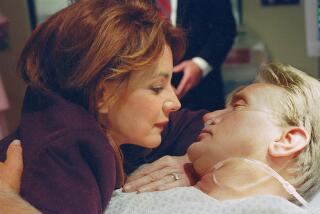A spy whose soul goes undercover
- Share via
GIVEN that its subject matter is spying, counterespionage and the Central Intelligence Agency, it’s not an accident that the first words we hear in “The Good Shepherd” turn out to be a complete lie.
“You are safe here with me,” a woman says to a man, but it’s not true. In fact, this complex, quietly dramatic film creates a world where that sentence is never true, a world of constant, mind-altering betrayal and mistrust, a world that makes the biblical words carved on the CIA building in Langley, Va. -- “And ye shall know the truth and the truth shall make you free” -- seem ironic at best.
It’s taken a dozen years for Eric Roth’s smart, thoughtful, psychologically complicated script to reach the screen under Robert De Niro’s careful and methodical direction, and it is easy to see why.
When Hollywood thinks spies, it thinks “Mr. & Mrs. Smith,” it doesn’t want to deal with an intricate, deliberately paced 2-hour and 37-minute work that not only quietly presents this quicksand world but also makes us feel what it would be like to live in it.
At the heart of this drama is Edward Wilson (Matt Damon), whose life in and out of the agency we follow for more than 35 years. He is the spymaster’s spymaster, in the espionage business from the earliest World War II days of the Office of Strategic Services, the organization that gave birth to the CIA.
Wilson, however, will remind no one of James Bond. He is a gray bureaucrat, a meticulous perfectionist, seemingly humorless and emotionless, who speaks only when he feels he has something worthwhile to say.
One of the earliest glimpses we have of Wilson, however -- playing Little Buttercup in drag in a Yale performance of “HMS Pinafore” -- gives the hint of the potential development of another kind of man.
What “The Good Shepherd” is intent on showing us is how the one man became the other, how Edward Wilson’s belief in duty above all else became his salvation and his betrayal, how a version of doing the right thing took over his life. It’s about how a soulless occupation can destroy souls, about the price you pay for being the way you are.
Damon, in his second major role of the year (after “The Departed”) once again demonstrates his ability to convey emotional reserves, to animate a character from the inside out and create a man we can sense has more of an interior life than he is willing to let on.
An argument could be made, in fact, that De Niro himself, famously undemonstrative in interview situations, was in part able to direct this role and this picture so well because he perhaps saw something of himself in its protagonist.
Because of the great regard his fellow performers have for him, De Niro was able to attract an impressive cast of costars. These include -- besides Michael Gambon as a Yale professor, Angelina Jolie as Wilson’s wife and Tim Hutton in flashback as his father -- a notable group of fellow intelligence operatives: Alec Baldwin, Billy Crudup, William Hurt, Lee Pace and John Turturro. Not as well known but equally strong are Tammy Blanchard as an early romantic attachment and Eddie Redmayne as Wilson’s adult son.
The film’s frame is the 1961 Bay of Pigs fiasco, the failed invasion of Cuba that will likely cause some heads to roll. As Wilson tries to find out what went wrong and to protect himself from internal attacks that could come from anywhere, a series of flashbacks shows us how he went from an idealistic Yale man to someone fanatically dedicated to his World War II work to the troubled man locked in a Cold War dance of death with his Soviet opposite number.
There’s way more plot in “The Good Shepherd” than can be easily summarized, and that is a good thing. And even though some things are expected, like coded dialogue of the “I’m here to see the tailor about a fitting” variety, much of what’s here is not.
An extended series of sequences, for instance, showing in detail how the agency goes about analyzing a photograph and a tape recording to see where they’re from, are truly fascinating.
Though biographer Tom Mangold, author of “Cold Warrior: James Jesus Angleton: The CIA’s Master Spyhunter,” is thanked in credits, it is clear from interviews that “The Good Shepherd” is most concerned about being true to the spirit and broader truths of the spy game than any specific details. When Gambon’s Dr. Fredericks, a professor of poetry, tells young Wilson “you have to look behind the words to understand the meaning,” he is telling us all we need to know.
*
“The Good Shepherd.” MPAA rating: R for some violence, sexuality and language. Running time: 2 hours, 37 minutes. In general release.
More to Read
Only good movies
Get the Indie Focus newsletter, Mark Olsen's weekly guide to the world of cinema.
You may occasionally receive promotional content from the Los Angeles Times.










